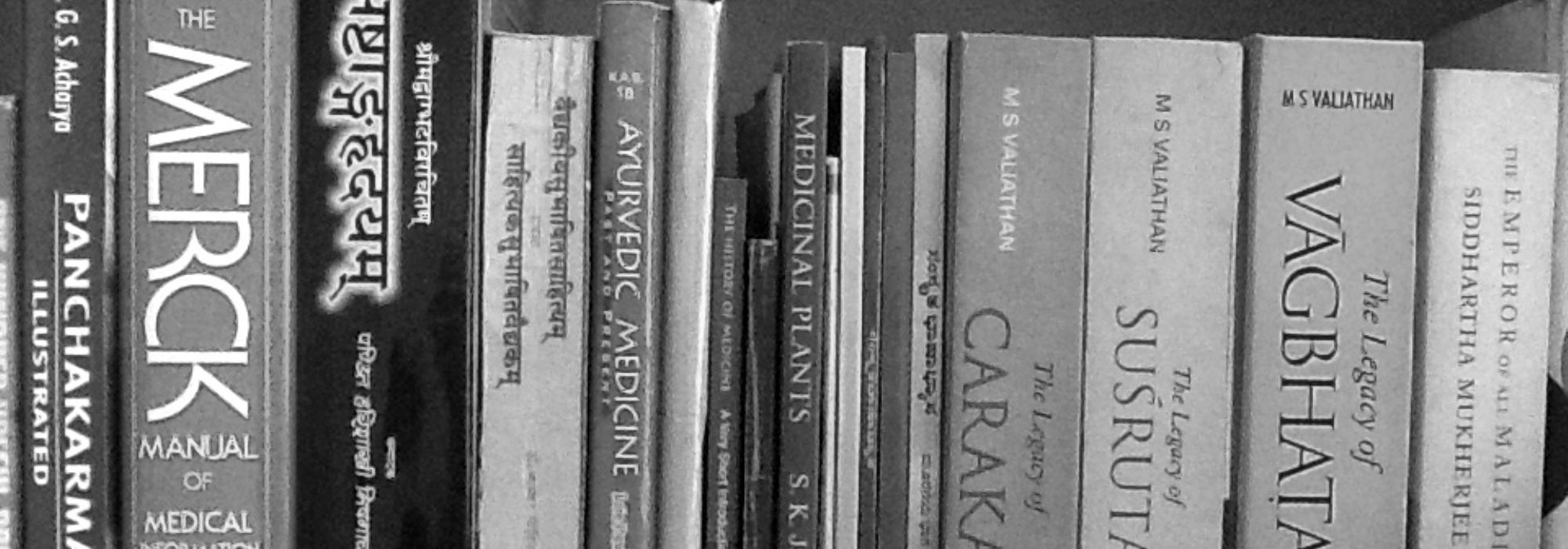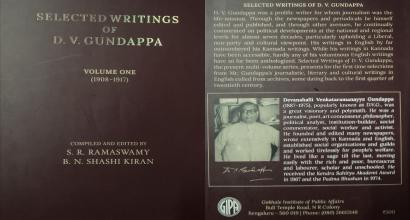The books on Ayurveda and related topics can be largely divided into five categories based on the level of the reader – for the lay person, for the student of Ayurveda, for the Ayurvedic practitioner, for the scholar (the advanced student), and for the researcher.
The student of Ayurveda needs to acquire familiarity with Sanskrit. This is best accomplished by a study of Sri Satchidanandendra Sarasvati’s Sanskrit self-study books (Adhyatma Prakasha Karyalaya).
In the appendix, we give a list of books in other disciplines that will greatly assist in developing a solid worldview for the student of Ayurveda. (Note: Many titles have been italicized; this indicates that they are linked to websites where the books/papers can be read or bought.)
1. For the Lay Person
- ಆಯುರ್ವೇದ ಪರಿಚಯ by S K Ramachandra Rao (ಪ್ರಸಾರಾಂಗ, ಬೆಂಗಳೂರು ವಿಶ್ವವಿದ್ಯಾಲಯ)
- ದೀರ್ಘಾಯುಷ್ಯದ ರಹಸ್ಯ by Prof. K N Udupa (ಡಿ.ವಿ.ಕೆ. ಮೂರ್ತಿ, ಮೈಸೂರು)
- आयुर्वेदपरिचयः by Raghavan Thirumulpad (संस्कृत भारती, बेङ्गलूरु)
- An Introduction to Ayurveda by M S Valiathan (Orient Blackswan, New Delhi)
2. For the Student of Ayurveda
Core Texts
- अष्टाङ्गहृदयम् of Vagbhata
Vagbhata’s Ashtangahrdayam is the best text-book of Ayurveda. It summarizes and enhances the classics of Charaka and Sushruta.
- ಪ್ರಸಿದ್ಧ ರಸೌಷಧಿಗಳು by Pandit Taranath
- Ross and Wilson Anatomy and Physiology in Health and Illness (12th Edition) by Anne Waugh and Allison Grant (Elsevier Health, UK)
- Kapoor's Textbook of Medicine for General Practitioners by Om Prakash Kapoor (S S Publishers)
Core References
- Vaidya Yoga Ratnavali – Formulary of Ayurvedic Medicines (IMPCOPS, Madras)
3. For the Ayurvedic Practitioner
- ಆಯುರ್ವೇದೀಯ ಪ್ರಕೃತಿ ಚಿಕಿತ್ಸೆ by Dr. M. Gopalakrishna Rao
- One Hundred Useful Drugs by Achanta Lakshmipathi (Chaukhamba Sanskrit Pratishthan)
- Panchakarma Illustrated by Dr. G. Shrinivasa Acharya (Chaukhamba Sanskrit Pratishthan)
- D V Gundappa's profile (Part 1 and Part 2) of Dr. S R Narasimha Iyengar (popularly known as Dr. Gundanna)
4. For the Scholar (the Advanced Student)
- Arunadatta’s commentary on the Ashtangahrdaya (Chaukhamba Sanskrit Pratishthan)
- Charaka Samhita
While Vagbhata's work is about 'science made,' Charaka's classic captures 'science in the making.' Scholars will benefit from reading the Sutra and Vimana sthanas of this ancient text.
- Popular Essays in Indian Philosophy by Prof. M Hiriyanna (Kavyalaya, Mysore)
- वैद्यकीय सुभाषित साहित्यम् by Bhaskara Govind Ghanekar (R R Publications)
This represents the मिश्र आयुर्वेद school
- Ayurvedic Medicine – Past and Present by Pandit Shiv Sharma (Chaukhamba Sanskrit Pratishthan)
This represents the शुद्ध आयुर्वेद school
- The History of Medicine: A Very Short Introduction by William Bynum (Oxford University Press)
- Luminaries of Indian Medicine by K R Srikanta Murthy (Chaukhambha Orientalia)
- The Introductory Essays in The Legacy series (The Legacy of Charaka, The Legacy of Susruta, and The Legacy of Vagbhata) by Prof. M S Valiathan (Universities Press)
- Medicinal Plants by S K Jain (National Book Trust, New Delhi)
- Happiness: A Very Short Introduction by Daniel M. Haybron (Oxford University Press)
- The Laws of Medicine by Siddhartha Mukherjee (Simon & Schuster India)
- Man, the Unknown by Alexis Carrel (Wilco Publishing House)
5. For the Researcher
Books
- The Rise and Fall of Modern Medicine by James Le Fanu (Little, Brown Book Group)
- Bad Science by Ben Goldacre (Harper Perennial)
- The Emperor of All Maladies: A Biography of Cancer by Siddhartha Mukherjee (Fourth Estate)
- The Gene: An Intimate History by Siddhartha Mukherjee (Penguin)
Papers
- Alternative Medicine Meets Science by Phil B. Fontanarosa, and George D. Lundberg (JAMA editorial, November 1998)
- Genome-wide analysis correlates Ayurveda Prakriti by Periyasamy Govindaraj et al. (Nature, October 2015)
- Double-blind, randomized, controlled, pilot study comparing classic ayurvedic medicine, methotrexate, and their combination in rheumatoid arthritis by D. E. Furst et al. (Journal of Clinical Rheumatology, June 2011)
- The end of homoeopathy (Lancet editorial, August 2005)
- Does medical treatment mean patient benefit? by William G. Pickering (Lancet Cover Story, February 1996)
- Screening could seriously damage your health by Stewart-Brown S. and Farmer A. (BMJ editorial, February 1997)
- Chaos – predicting the unpredictable by W J Firth (BMJ, December 1991)
- Ayurveda: The time to experiment by M S Valiathan and Urmila Thatte (IJAR, March 2010)
- Address at the WHO Congress on Traditional Medicine by Dr. Margaret Chan
- Investigating structural aspects to understand the putative/claimed non-toxicity of the Hg-based Ayurvedic drug Rasasindura using XAFS by Nitya Ramanan et al. (Journal of Synchrotron Radiation, September 2015)
- The discovery of artemisinin (qinghaosu) and gifts from Chinese medicine by Youyou Tu (Nature Medicine, October 2011)
- Alternative Medicine—Learning From the Past, Examining the Present, Advancing to the Future by Wayne B. Jonas (JAMA Editorial, November 1998)
- Science in the Age of Selfies by Donald Geman and Stuart Geman (PNAS, August 2016)
Apart from the aforementioned research papers, the following three papers, available on my Facebook page, would be of interest as well:
- The Guiding Philosophy of Ayurveda
- The Unfair Perception of Ayurveda: Reasons and Solutions
- Tridosha Mimamsa
Appendix
Sushruta famously said that a person who knows only one shastra can never understand with clarity even that shastra; it is therefore imperative for a physician to know allied shastras:
एकं शास्त्रमधीयानो
न विद्याच्छास्त्रनिश्चयम् ।
तस्माद्बहुश्रुतः शास्त्रं
विजानीयाच्चिकित्सकः ॥
In light of this statement, here are three broad areas of study that will, doubtless, aid the student of Ayurveda. The study of Vedanta relates to the nature of reality at the spiritual level. The study of Physics relates to the nature of reality at the material level. Literature gives an insight into human emotions, strengths, and failings.
I. Vedanta
- ಪರಮಾರ್ಥ ಚಿಂತಾಮಣಿ (Part 1 and Part 2) by Sri Satchidanandendra Sarasvati / Vedanta or the Science of Reality by K A Krishnaswamy Iyer (Adhyatma Prakasha Karyalaya, Bangalore)
- ಶ್ರೀಮದ್ಭಗವದ್ಗೀತಾ ತಾತ್ಪರ್ಯ ಅಥವಾ ಜೀವನಧರ್ಮಯೋಗ by D V Gundappa (Kavyalaya, Mysore)
II. Physics
- Six Easy Pieces by Richard P. Feynman (Basic Books)
- A Briefer History of Time by Stephen Hawking and Leonard Mlodinow (Bantam)
The third chapter, 'The Nature of a Scientific Theory' is particularly instructive.
- Cosmos by Carl Sagan (Little, Brown Book Group)
III. Literature
- The Mahabharata of Vyasa
- The Ayodhya Kanda from the Ramayana of Valmiki
Co-written by Hari Ravikumar










































Comments